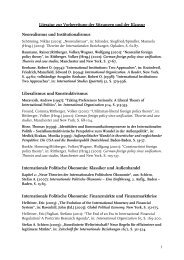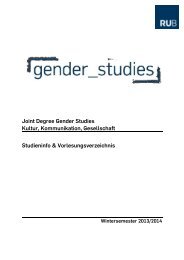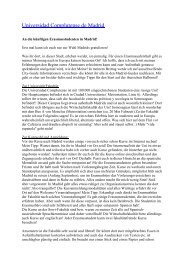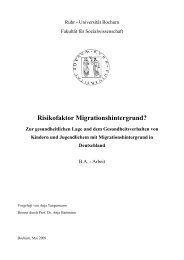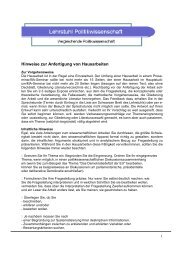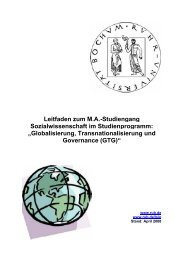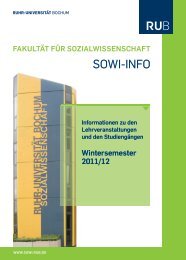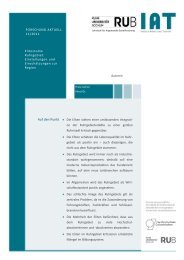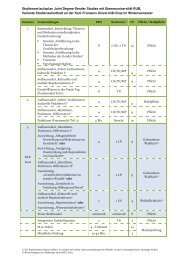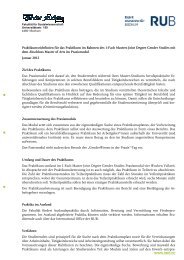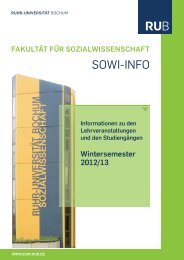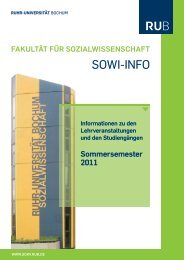View - Fakultät für Sozialwissenschaft der Ruhr-Universität Bochum
View - Fakultät für Sozialwissenschaft der Ruhr-Universität Bochum
View - Fakultät für Sozialwissenschaft der Ruhr-Universität Bochum
You also want an ePaper? Increase the reach of your titles
YUMPU automatically turns print PDFs into web optimized ePapers that Google loves.
Wilkesmann/Rascher self-governance and slowness page 7<br />
point it is even easier for him to find a new group than to stay in the first group. A further<br />
reason for not having a great power difference between the actors is connected to the first<br />
level of the dilemma. It would not be possible to solve the dilemma of collective learning.<br />
Even a powerful group member could not make the other employees release their<br />
information, if they do not want to. 5<br />
The structural conditions supporting a social group norm are: small groups and low power<br />
differences between the actors. These conditions support collective learning on the first (the<br />
production) level 6 . They only explain the domination of social norms, they do not give any<br />
information about the contents of the norm (whether the norm prescribes cooperative or<br />
defective action).<br />
The second way to overcome the problem of generating common knowledge is intrinsic<br />
motivation. Intrinsic motivation is defined by Heckhausen as follows:<br />
"Action is intrinsic if the means (the act) thematically corresponds to its ends (the action<br />
goal); in other words, when the goal is thematically identical with the action, so that it is<br />
carried out for the sake of its own objectives. For example, achievement behavior is intrinsic<br />
if it is engaged in merely to accomplish a desired outcome, because it solves a problem or<br />
leads to a self-evaluation of competence. Here, the outcome, a particular accomplishment, is<br />
not a means toward some other nonachievement-related end." (Heckhausen 1991: 406)<br />
If all actors have intrinsic motivation, there is no prisoner's dilemma. (Wilkesmann 1994).<br />
While the expenses, which were necessary to work out solutions for the given problems, have<br />
been registered as costs in the original prisoner's dilemma situation, these do not appear as<br />
costs when the actors are motivated intrinsically. The solutions are found, because working is<br />
fun and the solution process is interesting. Therefore an actor, who is motivated intrinsically,<br />
does not deduct these expenses from his profit, but adds them up as an extra profit. As a<br />
result, the cooperation strategy becomes individually rational. Here, again, the actors'<br />
subjective perception transforms the starting matrix. (Kelly/Thibaut 1978).<br />
Taking into consi<strong>der</strong>ation that intrinsic motivation is not a selective incentive it is not possible<br />
to produce it directly. The only way is to arrange the structural prerequisites in a manner that<br />
intrinsic motivation might be stimulated. Work psychological research defines a positive<br />
correlation between freedom of action and intrinsic motivation. Freedom of action is defined<br />
5<br />
6<br />
distance of each point from the source points in those subnetworks) affect the distribution<br />
of power within the subnetworks." (Yamagishi/Gillmore/Cook 1988, S. 849/850)<br />
Another argument for stabilizing a social norm is the well-known shadow of the future<br />
(Axelrod 1984).<br />
The management has to structure project groups with that scope.<br />
7



